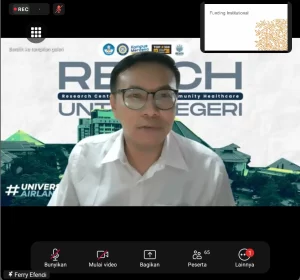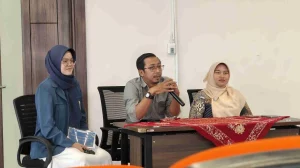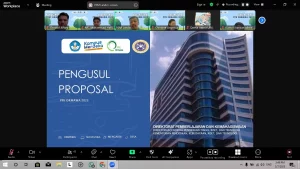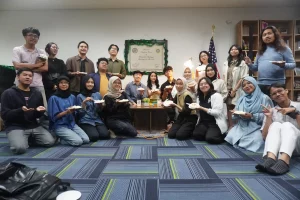UNAIR NEWS – People may have noticed a village of mentally disabled people (tuna grahita) in Ponorogo. In East Java, the population of tuna grahita reaches 500 people, 323 of them live in Sidoharjo village, Jambon sub-district, Ponorogo. Their intellectual and adapting disability have made them rely on others on daily basis.
Even though they are protected by the law and receiving fund from many parties, the mentally disabled has not been able to maximize their ability such as in taking care of their health.
A group of students from Nursing Education program, Faculty of Nursing, Universitas Airlangga encouraged mentally disabled people to implement hygiene and healthy life style (PHBS). The four students were Fitria Budiarti (head of the team/ 2013), Enis Rezqi Maulida (member/2013), Magita Novita Sari (member/2013), and Putri Mei Sundari (member/2014).
PHBS implementation was done through a student creativity program and the proposal was titled “INSTING (Independent Skill Training) to Improve Health and Prosperity of the Mentally Disabled in Sidoharjo Village, Jambon, Ponorogo”. The PKM-M proposal “INSTING” has made it to get funding from General Directorate of Higher Education, Ministry of Research, Technology and Higher Education 2016.
INSTING team had eight activity programs. They were publicization, health awareness book writing, health instruments’ procurement, direct tutorial, booklet observation, house visits and documentary recording.
To simplify the implementation, INSTING team activated again cadres to guide the mentally disabled. According to Fitria, the cadres were the senior citizen and other family member of the mentally disabled people. To improve coordination with the local officials so the implementation will run well, they target the mentally disabled people from Klitik hamlet, Sidoharjo.

“Because there were more public and village officials in Klithik, we finally chose it as the target village. There, we guide ten mentally disabled so the implementation would run effective. We finalized the target. If it works, we will continue with other villages,” said Fitria.
The mentally disabled people were taught to implement hygiene and healthy life style, plant the crops and harvest the vegetables to fulfill individual and families’ nutrition. With that plan, INSTING team is expected to build the mentally disabled person to be independent so deserving life can be realized.
“The success indicator of our program was when their dependency to their family getting less and less. We always evaluate the INSTING program. Besides, there was our program which was adopted by the locals. The cadres also kept training the mentally disabled. And, health population is also improving,” said Fitria. (*)
Author: Defrina Sukma S.
Editor: Nuri Hermawan








